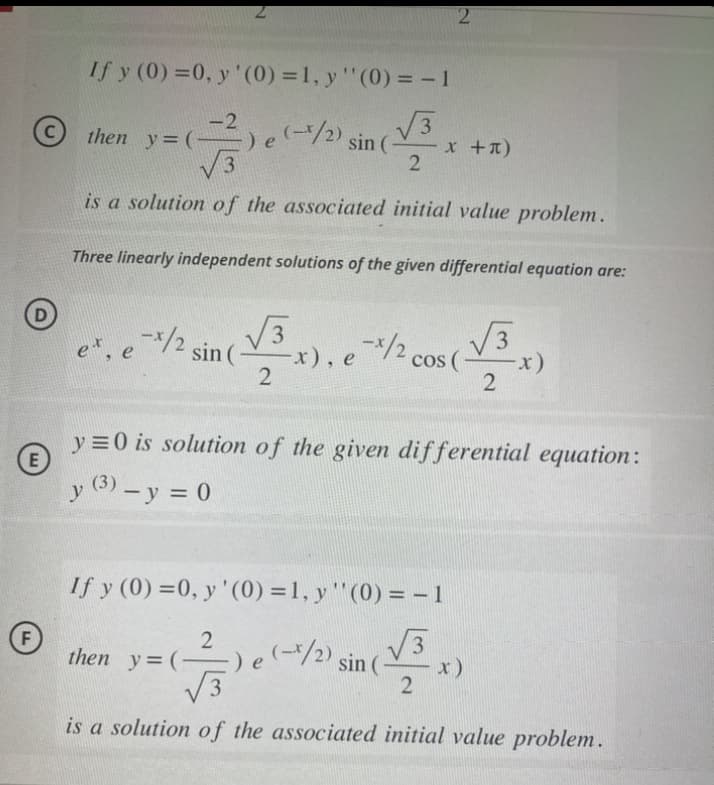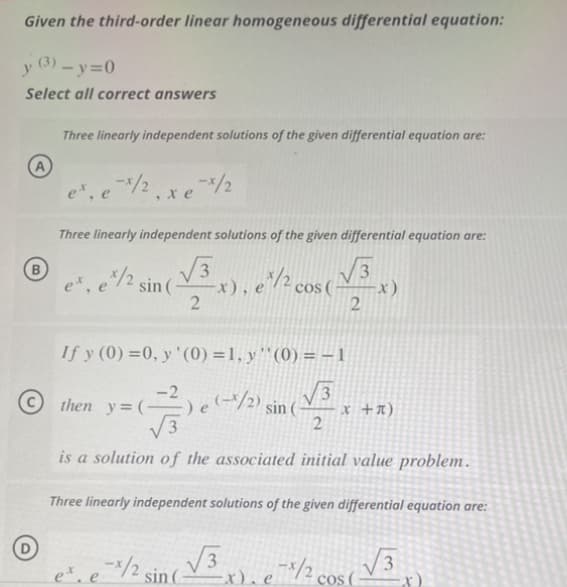D E F If y (0) = 0, y '(0) = 1, y '' (0) = -1 √√3 2 -2 3. is a solution of the associated initial value problem. Three linearly independent solutions of the given differential equation are: then y=(- -) e (-¹/2) sin( -*/2 ex, ex/2 sin ( е 3 √3 2 then y=(1 -x), e 27/7) e x + x) -x/2 cos ( y=0 is solution of the given differential equation: y (3) - y = 0 √√3 2 If y (0)=0, y '(0) = 1, y '' (0) = -1 √√3 2 is a solution of the associated initial value problem. (-1/2) sin( -x) x)
D E F If y (0) = 0, y '(0) = 1, y '' (0) = -1 √√3 2 -2 3. is a solution of the associated initial value problem. Three linearly independent solutions of the given differential equation are: then y=(- -) e (-¹/2) sin( -*/2 ex, ex/2 sin ( е 3 √3 2 then y=(1 -x), e 27/7) e x + x) -x/2 cos ( y=0 is solution of the given differential equation: y (3) - y = 0 √√3 2 If y (0)=0, y '(0) = 1, y '' (0) = -1 √√3 2 is a solution of the associated initial value problem. (-1/2) sin( -x) x)
Advanced Engineering Mathematics
10th Edition
ISBN:9780470458365
Author:Erwin Kreyszig
Publisher:Erwin Kreyszig
Chapter2: Second-order Linear Odes
Section: Chapter Questions
Problem 1RQ
Related questions
Question

Transcribed Image Text:E
F
If y (0) = 0, y '(0) = 1, y '' (0) = -1
√√3
2
is a solution of the associated initial value problem.
Three linearly independent solutions of the given differential equation are:
√3x). e/2 cos( √√3
-x),
2
2
then y=(-) e
-2) e (-1/2) sin(
e*, e-*/2 sin (
et
If y (0)=0, y '(0) = 1, y '' (0) = − 1
√√3
then y=(:
2
y=0 is solution of the given differential equation:
y (3) - y = 0
(-1/2) sin(
x + x)
2
(7) e
is a solution of the associated initial value problem.
-x)
- x)

Transcribed Image Text:Given the third-order linear homogeneous differential equation:
y (3)-y=0
Select all correct answers
A
Three linearly independent solutions of the given differential equation are:
ex, e
-*/2xe X/2
Three linearly independent solutions of the given differential equation are:
√√3
x), e*/2 cos ( √√3
2
2
ex, e*/2 sin(-
If y (0)=0, y '(0) = 1, y'' (0) = − 1
√√3
2
is a solution of the associated initial value problem.
Three linearly independent solutions of the given differential equation are:
(²) e (-1/2) sin (
then y=(-
√√3
-x). e 1/20
ex. e-x/2 sin (-
x)
x + x)
co
cos (
√√3
Expert Solution
This question has been solved!
Explore an expertly crafted, step-by-step solution for a thorough understanding of key concepts.
Step by step
Solved in 2 steps with 2 images

Recommended textbooks for you

Advanced Engineering Mathematics
Advanced Math
ISBN:
9780470458365
Author:
Erwin Kreyszig
Publisher:
Wiley, John & Sons, Incorporated

Numerical Methods for Engineers
Advanced Math
ISBN:
9780073397924
Author:
Steven C. Chapra Dr., Raymond P. Canale
Publisher:
McGraw-Hill Education

Introductory Mathematics for Engineering Applicat…
Advanced Math
ISBN:
9781118141809
Author:
Nathan Klingbeil
Publisher:
WILEY

Advanced Engineering Mathematics
Advanced Math
ISBN:
9780470458365
Author:
Erwin Kreyszig
Publisher:
Wiley, John & Sons, Incorporated

Numerical Methods for Engineers
Advanced Math
ISBN:
9780073397924
Author:
Steven C. Chapra Dr., Raymond P. Canale
Publisher:
McGraw-Hill Education

Introductory Mathematics for Engineering Applicat…
Advanced Math
ISBN:
9781118141809
Author:
Nathan Klingbeil
Publisher:
WILEY

Mathematics For Machine Technology
Advanced Math
ISBN:
9781337798310
Author:
Peterson, John.
Publisher:
Cengage Learning,

